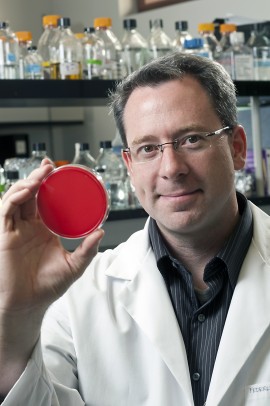Researcher works to fool bacteria

Michael Federle received a five-year, $500,000 grant from the Burroughs Wellcome Fund for his research. Photo: Roberta Dupuis-Devlin/UIC Photo Services (click on image for larger file size)
Michael Federle believes bacteria are smarter than scientists give them credit for.
By studying quorum sensing — the way bacteria cells communicate with one another — Federle is trying to convince sickness-causing microorganisms to remain in a nonhostile state.
Federle, assistant professor of medicinal chemistry and pharmacognosy, is one of 10 U.S. scientists to receive a five-year grant from the Burroughs Wellcome Fund to bring multidisciplinary approaches to the study of human infectious diseases.
The program provides $500,000 to support accomplished investigators still early in their careers, helping them study what happens at the points where human and microbial systems connect.
“We’re losing the war with bacteria,” Federle said. “Every antibiotic we’ve come up with has some level of resistance.”
Federle is studying the bacteria in streptococci, which are responsible for strep throat, meningitis, bacterial pneumonia, endocarditis, erysipelas and the flesh-eating bacteria necrotizing fasciitis.
His research explores ways to disrupt biofilms — communities of bacteria that live on a surface and are extremely resistant to antibiotics.
Manipulating bacteria that carry health complications is Federle’s long-term goal.
“If we can manipulate bacteria by understanding the chemical signals they use, then we can interfere with the bacteria’s ability to make people sick,” he said. “We’ll try to fool the bacteria by artificially stimulating them.”
Federle said he was “flabbergasted” to be selected for the Burroughs Wellcome award because of the quality and impact of research by other winners.
“I don’t consider this work. I’m having so much fun unraveling the basic nature of bacterial communication,” he said.
